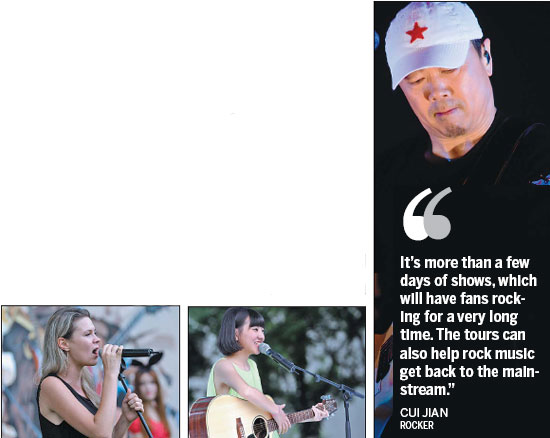 |
|
Evergrande Star Music Festival will be held in 60 Chinese cities, featuring both established musicians and young talents, like Sensitive Flower (left), Zhou Ziyan (middle) and Cui Jian. Photos by Zou Hong / China Daily
|
With two stages, pop and rock, the music festivals will have a mixture of big stars and new singer-songwriters from the local cities.
The first star Song invited is China's godfather of rock 'n' roll, Cui Jian, who will perform at more than 20 stations.
"He is the symbol of China's live music scene and I believe he can help ignite the passion of music festivals," Song says.
Cui is excited about the tours.
"It's more than a few days of shows, which will have fans rocking for a very long time," Cui says. "The tours can also help rock music get back to the mainstream."
He also points out that the outdoor music festival is still new in China and takes time to be widely accepted by audiences.
Most of the outdoor music festivals in China are held in developed cities like Beijing, Shanghai and Guangzhou. It is not a healthy trend for the music industry, Song says.
He had spent a year watching live house shows at second- and third-tier cities, where he observed the potential of new music powers.
"I found very good singers at small bars in those smaller cities but they don't have the chance to perform on a larger stage. Our music festival tour will give those artists the opportunity," he says.
It's not the first time that Song has broken conventions in the industry. In 1996, he spent 200,000 yuan to help Gao Xiaosong, who was also a student of Tsinghua University, release the album Youth with No Regrets. It proved to be a sound investment. The album sold millions of copies in China and kicked off an era of campus ballads music genre.
Then the two joined hands to form Taihe Rye Music Company, discovering and producing albums for many pop stars, like Pu Shu, Lao Lang and Li Yuchun.
As the former general manager of Warner Music China, Song was the earliest to produce and publish digital music in 2003. The ring tone download service earned him 20 million yuan in 2004.
In 2008, he withdrew from the scene and opened a Peking roast duck restaurant in Beijing's CBD area. Upon his return in 2012 to work at Evergrande Music, his focus was on purchasing copyrights from indie labels such as Thirteen Months Company and TV shows.
Among them include the popular talent show Chun Wan Express, which selects new artists to perform at CCTV's Chun Wan, the most-watched annual Spring Festival Gala.
Song opines that there is a missing link in the music industry between singer-songwriters and the audiences.
He points out that as the number of TV shows broadcasting music videos and radio program introducing new songs reduces, talented Chinese singer-songwriters do not have a regular and effective platform to introduce their music.
On the other hand, young music fans are eager to listen to different types of new songs, which is why they visit live shows in bars, watch talent shows on TV and listen to online music to discover new faces and new works.
"When I was in the university, everyone listened to the same song, like Cui Jian's. But today, young Chinese music fans want a variety of music, which displays their individualities," he says.
Shen Lihui, the founder and director of Modern Sky, one of the largest indie music labels in China, says the music festival tour is another business form to run the music industry.
"The main contribution of having the outdoor music festival tour for such a long time is to widen the influences of outdoor music festivals among Chinese audiences," says Shen, who founded Strawberry Music Festival, one of the country's biggest outdoor music festivals, in 2009.
He also says that since the market of music festivals in China is still new, he is not worried about competition, and there is room for growth. With about 100 outdoor music festivals already taking place around China every year, he predicts that more than 500 music festivals will be held in the next three to five years.
We recommend:
